Key takeaways:
- Intermittent fasting can lead to significant benefits including weight loss, improved mental clarity, and health marker enhancements like insulin sensitivity.
- Popular methods include the 16/8 approach, 5:2 diet, and alternate-day fasting, allowing individuals to choose a style that fits their lifestyle.
- Maintaining a balanced diet is essential during eating windows, focusing on nutrient-dense foods, hydration, and listening to one’s body to ensure sustainable success.
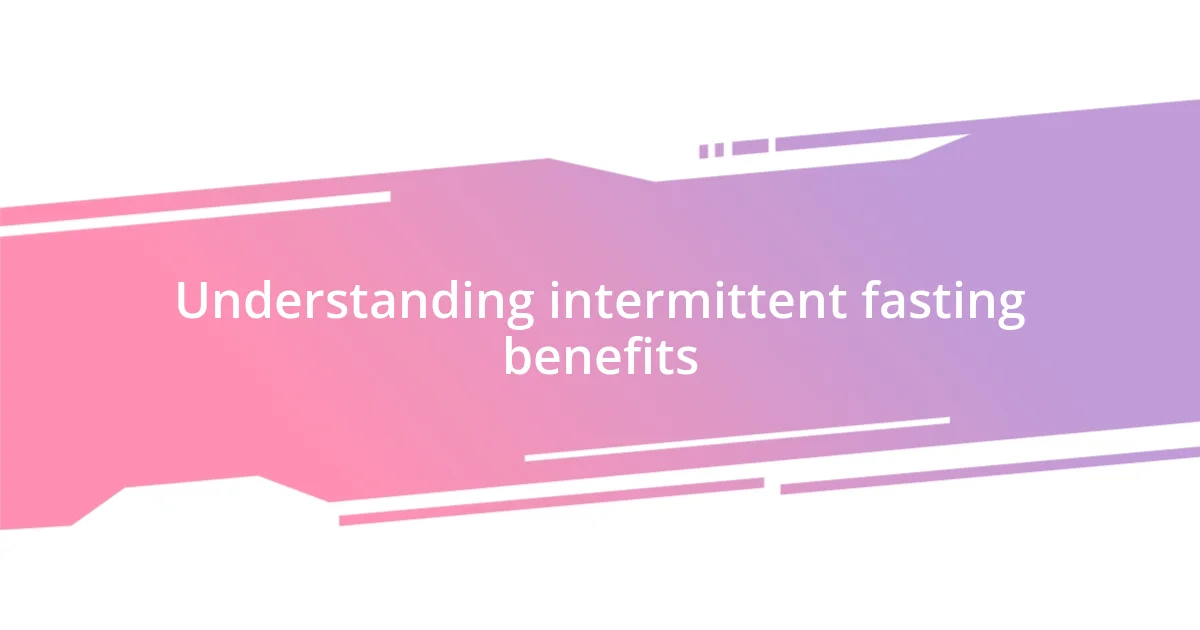
Understanding intermittent fasting benefits
Intermittent fasting offers a range of benefits that many individuals, including myself, have found transformative. One key advantage is weight loss; when I first tried it, I noticed how the structured eating patterns naturally reduced my calorie intake. Have you ever experienced that sense of control when you skip a meal and realize you weren’t even hungry?
Another remarkable benefit is improved mental clarity. I’ve had days where my mind feels sharper than ever during fasting, almost like a fog lifting. It’s fascinating how our brains can thrive on the cleaner energy that comes from intermittent fasting. Have you thought about how your eating habits could be affecting your focus and productivity?
Let’s not forget the potential health markers that can improve as well, like insulin sensitivity. I remember getting my health check-up and seeing notable changes in my blood sugar levels after committing to intermittent fasting. It made me wonder, how many people out there are unaware of the profound effects their eating schedules could have on their long-term health?
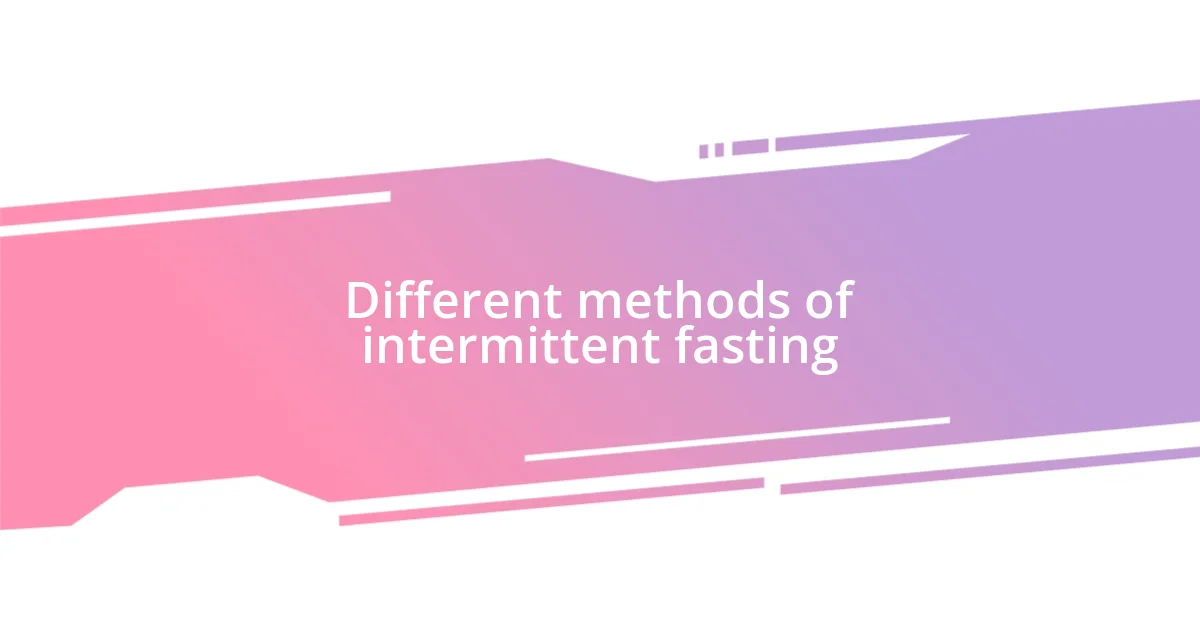
Different methods of intermittent fasting
There are several popular methods of intermittent fasting, each tailored to fit different lifestyles. One of the most well-known is the 16/8 method, where I typically fast for 16 hours and eat within an 8-hour window. Personally, I found this approach surprisingly easy to integrate into my daily routine, especially since I usually skip breakfast. How about you—have you tried adjusting your eating schedule in a similar way?
Another intriguing method is the 5:2 diet, which involves eating normally for five days while restricting calorie intake to about 500-600 calories for two non-consecutive days. I tested this out, and it made me more mindful of what I consumed on my low-calorie days. The challenge of picking nutrient-dense foods was enlightening and quite often led to delicious discoveries. Have you ever had to rethink your meals to make them more nutritious?
For those who prefer less structure, there’s alternate-day fasting. With this method, I fast every other day, which can lead to significant results, though I found it more challenging. It requires a strong willpower, but it’s amazing what the body can adapt to. Doesn’t it make you consider how flexible our eating habits can be?
| Method | Description |
|---|---|
| 16/8 | Fast for 16 hours; eat within an 8-hour window |
| 5:2 | Eat normally for 5 days, limit calories to 500-600 on 2 days |
| Alternate-day fasting | Fast every other day for weight loss benefits |
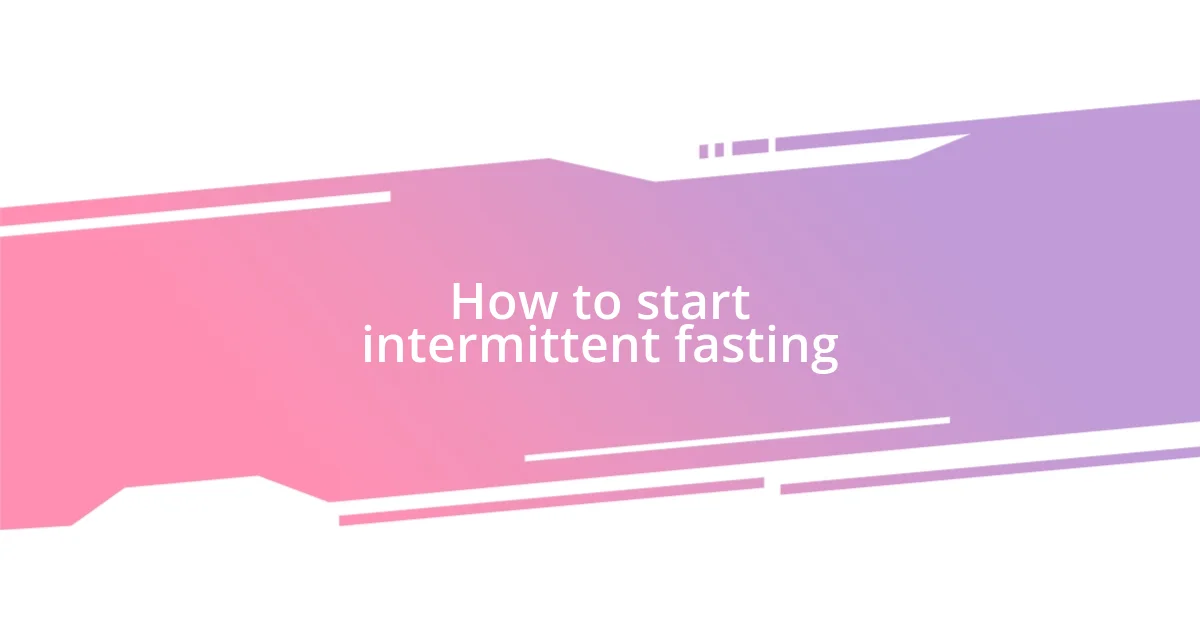
How to start intermittent fasting
Starting intermittent fasting can feel a bit daunting at first, but I remember when I took my first steps. I found it helpful to set a clear start date and choose a method that resonated with my lifestyle. For me, beginning with the 16/8 method felt like the ideal entry point. I was able to ease my way into it, often enjoying a leisurely morning without feeling the pressure to eat right away. I think there’s something liberating about not rushing to breakfast; it allowed me to focus on my morning routine instead.
Here are some practical steps to consider as you embark on your intermittent fasting journey:
- Choose Your Method: Decide on a fasting pattern that suits your routine, like 16/8 or the 5:2 diet.
- Prepare Mentally: Take time to educate yourself about intermittent fasting. Knowing what to expect can ease anxiety.
- Stay Hydrated: Drink plenty of water during fasting periods. I found herbal teas to be comforting, especially early in the day.
- Ease Into It: If going straight to 16 hours feels overwhelming, start with a shorter fast and gradually increase it.
- Listen to Your Body: It’s essential to pay attention to how your body reacts. I learned that some days might be easier than others, and that’s perfectly normal.
- Plan Meals Ahead: Think about nutrient-dense foods for your eating window. I made meal prepping a fun Sunday ritual, which transformed my approach to meals.
By following these steps, you can create a smoother transition into intermittent fasting while ensuring you remain mindful and focused on your well-being.
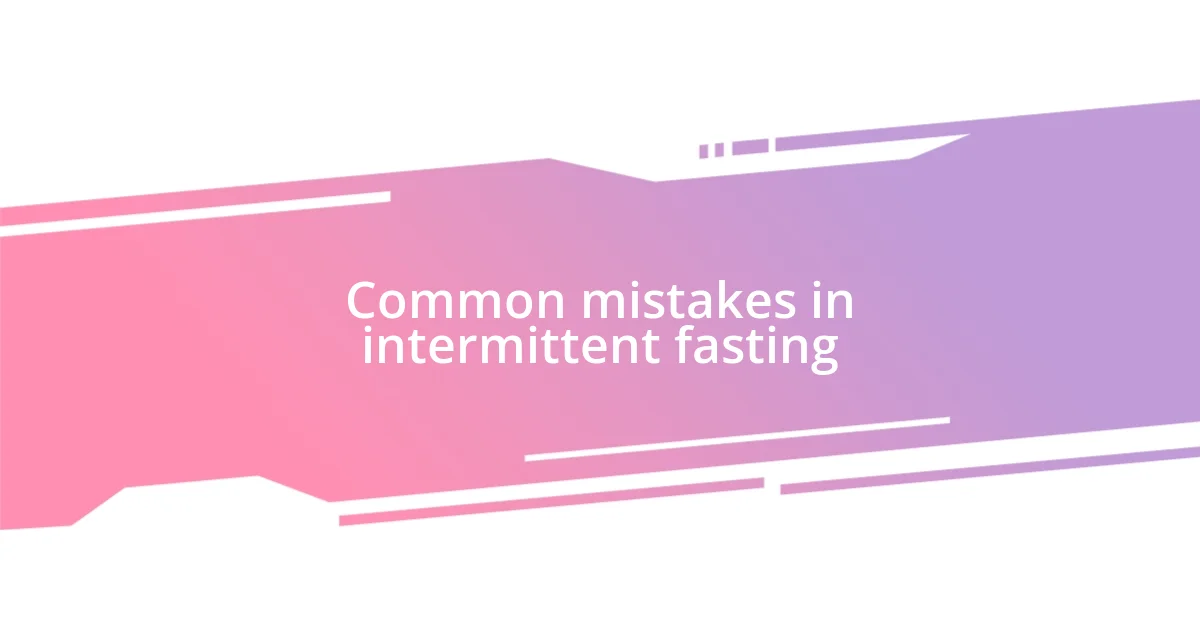
Common mistakes in intermittent fasting
When it comes to intermittent fasting, one of the most common mistakes I see is overindulging during the eating window. It’s tempting to think that because you’re fasting, you can eat whatever you want. I made this mistake early on—how about you? I remember treating myself to a heavy pizza and ice cream feast after a long fast, only to feel sluggish and regret it later. It’s crucial to focus not just on the time spent fasting but also on the quality of the food you consume when you aren’t fasting.
Another pitfall is not staying hydrated. I can’t stress enough how vital water is during fasting periods. Initially, I would forget to drink enough and ended up feeling tired and cranky, mistaking dehydration for hunger. Have you experienced this? Now, I make it a point to keep my water bottle close—herbal tea and flavored water helped me overcome those moments when I would wander into the kitchen looking for snacks.
Lastly, many people underestimate the importance of gradual adaptation. Jumping straight into extended fasting can leave you feeling defeated. I started with short 12-hour fasts, which built my confidence and helped my body adjust without overwhelming me. Have you thought about easing into it as well? Listening to your body’s signals during this process is a game-changer; it fosters respect for your body’s needs and promotes long-term sustainability in your fasting journey.
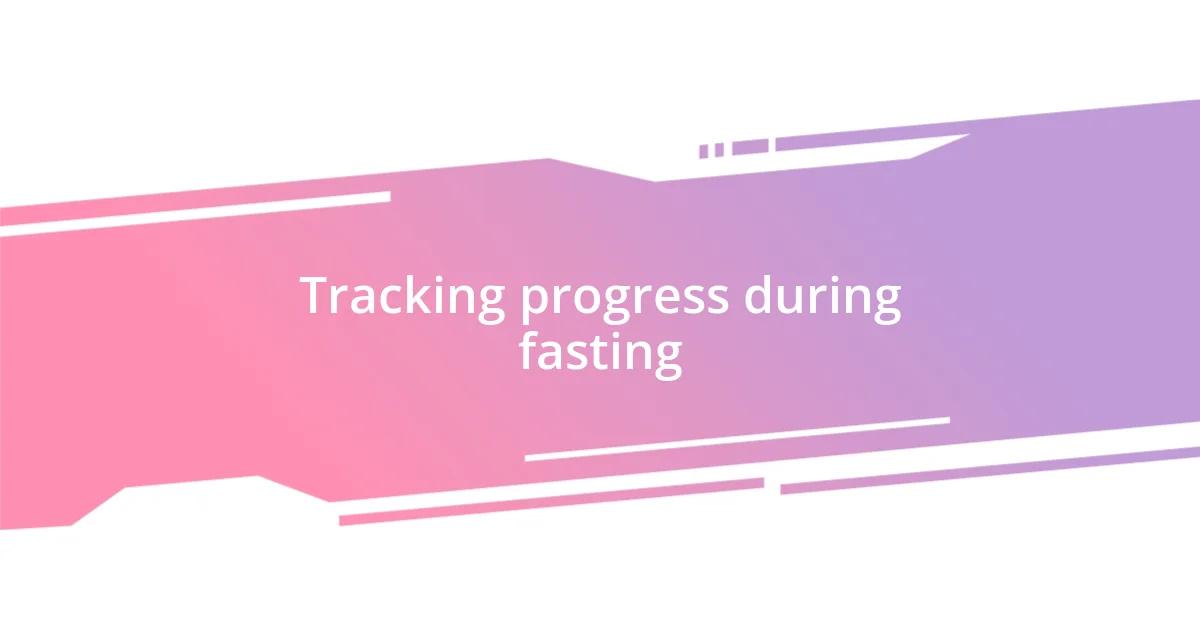
Tracking progress during fasting
Tracking your progress during intermittent fasting is essential if you want to stay motivated and see results. I found that keeping a journal helped me immensely. Each day, I would jot down how I felt, what I ate, and any changes I noticed in my energy levels or mood. Have you ever considered how simply documenting your journey can provide insightful data and encourage you to stick with your plan?
Weight isn’t the only metric to focus on, though. I remember when I started measuring my emotional well-being alongside my physical progress. For example, while my scale didn’t budge some weeks, my energy levels soared and my cravings diminished. I began to understand that even small victories, like skipping that mid-afternoon snack I used to crave, were just as important as the number on the scale. Have you thought about redefining what success looks like during your fasting journey?
Finally, using apps or tools to track your fasting windows can significantly enhance your experience. I found calorie-counting apps particularly useful to measure my food intake during eating hours. Not only did they help me ensure I was eating nutrient-dense foods, but I also felt a sense of control over my diet. How do you currently keep track of your fasting efforts? It can be empowering to have tangible data that reflects your progress and keeps you accountable.
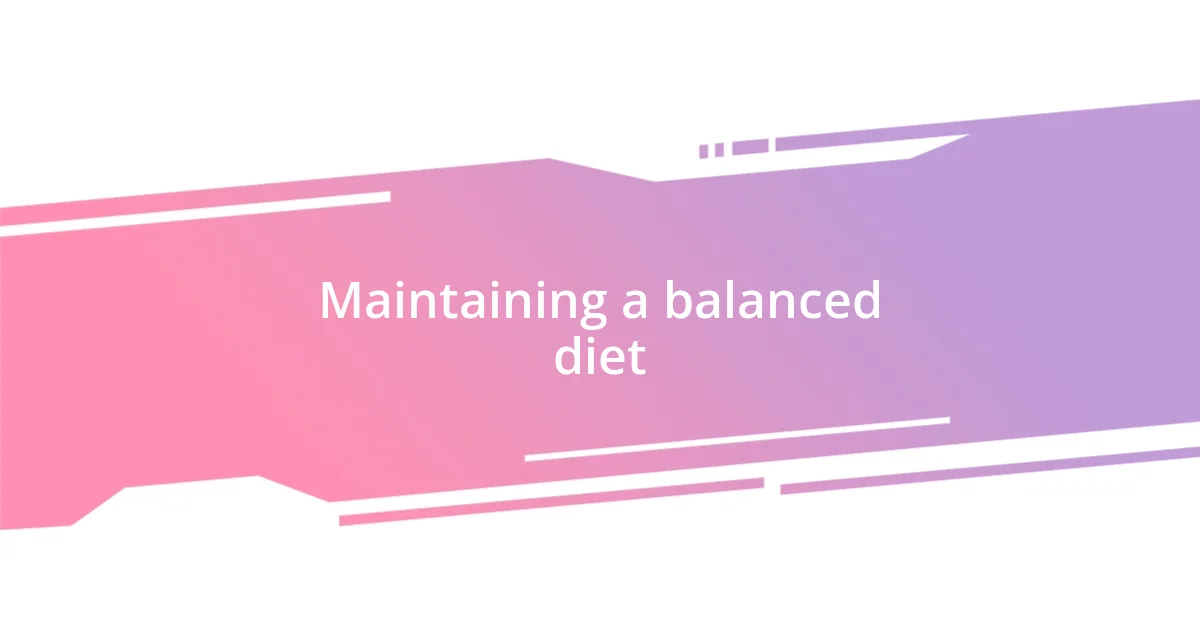
Maintaining a balanced diet
Maintaining a balanced diet while intermittent fasting is crucial for overall well-being. I’ve learned that prioritizing nutrient-dense foods during my eating windows makes a significant difference. There were times when I opted for convenience over health, and I always regretted the subsequent energy slumps. Have you ever noticed how good it feels to nourish your body with fresh fruits and vegetables instead?
I remember one week when I focused on meal prepping, and it transformed my eating habits. By preparing healthy options in advance, I avoided the temptation of junk food. Having a fridge stocked with wholesome meals not only simplified my choices but also reduced my stress around eating. Are you putting in that extra effort to set yourself up for success during your eating periods?
It’s also important to listen to your body’s signals, something I had to learn the hard way. In the beginning, I often ignored hunger cues and ended up bingeing. Now, when I feel hungry between meals, I take a moment to assess what my body truly needs. This approach has helped me establish a healthier relationship with food. How often do you check in with your own body during your fasting journey?
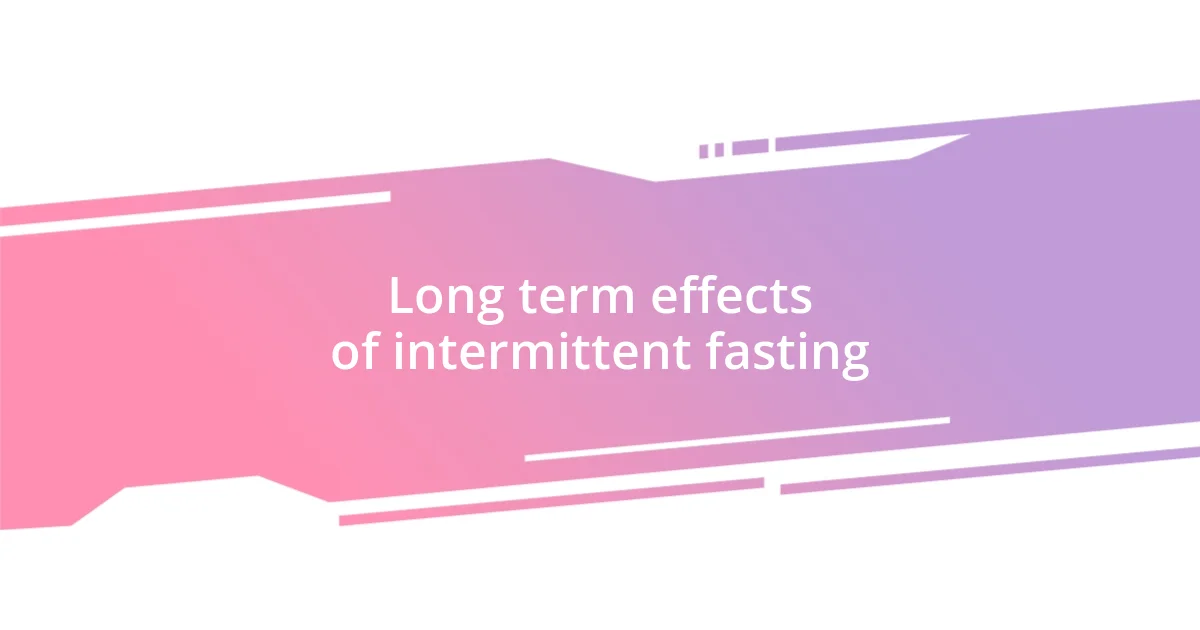
Long term effects of intermittent fasting
The long-term effects of intermittent fasting can really surprise you. I remember when I first started this approach, I was skeptical about how it would impact my health long-term. Over time, I noticed not just physical changes, like weight loss, but also improvements in mental clarity. It’s fascinating how my focus sharpened during fasting periods—have you ever noticed how clear your mind can become when you give it a break from constant food intake?
I also found that my relationship with food evolved dramatically. Initially, I approached meals with a scarcity mindset, worried about what I “couldn’t” have. But, as I continued with intermittent fasting, I started to appreciate the food I consumed more deeply. This shift made me mindful and encouraged me to choose high-quality, nutritious options. Have you ever considered how long-term practices can reshape your perspective on food entirely?
Interestingly, some research suggests that intermittent fasting may have protective effects against various diseases. For example, studies indicate potential reductions in markers of inflammation and improved metabolic health over time. Personally, knowing that not only my body but also my overall health was benefiting gave me a surge of motivation. Doesn’t it feel good to think that what you’re doing now could lead to a healthier future?














